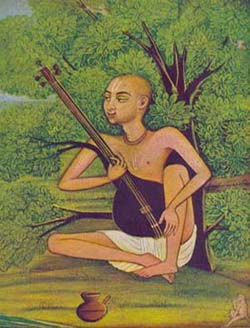Swami Haridas was a spiritual poet and classical musician. The great saint and musician Swami Haridas ji was not only the nurturer of creative talents in music like Tansen and VaijuBawra but also the greatest saint of all time based in Nidhivan, Vrindavan.
Believed to be the incarnation of Lalita Sakhi, a close and dear friend of Radha, Swami Haridas is popularly known as a saint musician of North India. He is exclusively credited for composing a large number of devotional songs and composing the Dhrupad music, aside from creating new techniques of music. Swami Haridas is apparently the guru of the famous musician, Tansen, apart from having a galaxy of musicians in his court, namely, Bakshu, Bhanu, and Baiju. Celebrated for establishing the Haridasi School of Mysticism, Haridas was a pioneer for spreading dhrupad. It was his melodious voice and soulful language that inspired many people, declaring him a leading figure in the Bhakti movement and music.[1]
Contents
Early Life
Swami Haridas is believed to have been born in 1480 A.D. in Rajpur near Vrindavan in Uttar Pradesh. He was born to Gangadhar and Chitra Devi. It is also said that his father was a Saraswat Brahmin from Multan. His guru was Ashudharji. He became a sanyasi at the age of 25 and came to Vrindavan. There he built his ashram[2] in Nidhivan and sang his own compositions dedicated to the immortal love of Radha-Krishna. He was also an ardent follower of 'Nimbarka Sampradaya', the major Vaisnava tradition.
Contribution to Music
Swami Haridas is attributed with approximately 128 songs, out of which 110 are devotional known as 'Keli Mala' and 18 are philosophical known as 'Siddhanta Pada'. They are full of melody and rhythmic assets as they are completely poetic. 'Keli Mala' depicts the eternal love of Radha-Krishna, while 'Siddhanta Pada' illustrates complete devotion to God and separation from natural life. It is said that he also penned tirvats, ragamalas, and many other forms. He is also noted for his works of stringed instruments, such as Kinnari and Aghouti, and of drums, like Mridanga and Daff.[1]





